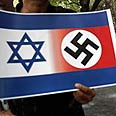
Sanctioning Jewish deaths
Op-ed: Western intellectuals, cultural icons have much Israeli blood on their hands
During the German occupation of Paris, Sartre was a cynical profiteer concerned exclusively with his own literary career and ready to compromise with the authorities. Sartre worked for “Comoedia”, a magazine financed by the Nazis; his work “The Flies” got the blessing of the German censors; his companion, the literary goddess Simone de Beauvoir, worked for the national pro-Germans radio.
After the war, Sartre rebuilt his image of grand-resistant. He already was familiar with the horrors of the Soviet Gulag, but did not reveal as "not to discourage the moral of the Billancourt’s workers," while French intellectuals organized a solidarity rally in Paris in support of the official Soviet position that Jewish doctors had assassinated communist leaders.
Much less known is Sartre’s praise for Arab terrorism. When 11 Israeli athletes were butchered at the 1972 Munich Olympics in, Sartre wrote: “Terrorism is a terrible weapon, but the oppressed poor have no others."
The lesson from Sartre's story is urgent for our time; namely, the appeal of Jihadi totalitarianism and Palestinian terrorism to Western intellectuals and their silence on it. It reveals how deeply Jew-hatred devoured the minds of the intellectual elite. In his recent book, Theodor Darlymple has called it “The New Vichy’s Syndrome."
When legions of “martyrs” started blowing themselves up in the streets of Jerusalem, Tel Aviv, Afula, and then in London, Madrid, Bali and New York, how many Western intellectuals expressed this Sartrian, lame empathy for the murderous rage?
Tongue has power of life and death
Indeed, most intellectuals, academics, writers, columnists, Nobel laureates and journalists have been enablers of evil, giving cover to international criminals and to the ongoing slaughter of Jewish. It seems like a Nazi fantasy, but some renowned cultural icons have also spoken of removing any Israeli presence from academic institutions and terminating any scientific cooperation with Israel.Today such writers’ positions, perhaps unconsciously, echo those of Ahmadinejad and Hamas: Jostein Gaarder, author of “Sophie’s World,” wrote an essay saying that Israel has lost the right to exist; Tom Paulin, an Irish poet, recommended that “Brooklyn-born settlers be shot dead”; and Prominent French sociologist Edgar Morin dubbed Israel “a cancer."
Elsewhere, Nobel laureate José Saramago compared realities in the Palestinian territories with Auschwitz; Swedish bestselling author Henning Mankell, who was part of last year's pro-Hamas Flottilla, has just attacked the "Israeli regime" on Haaretz; and famous British historian,Eric Hobsbawm referred to Israel as a “militarist, culturally disappointing and politically aggressive nation-state."
Yet there's more: t Italian historian Angelo D’Orsi only regrets that “maybe its too late” to reset Israel, because “the scandal is the very existence of that state”; Nobel laureate Nadine Gordimer urged her friend, Susan Sontag, to not accept a prize from Israel; much celebrated post-modern philosopher, Slavoj Zizek, nazifies Israel and accuses the Jewish State of “ethnic cleansing”; Italian Noble laureate, writer Dario Fo, endorsed a boycott of Israel’s books in Turin.
A.N. Wilson, a prominent British writer, “reluctantly” concluded Israel no longer has a right to exist, while British dramatist David Hare wrote that the Jews have “polluted” the Promised Land and “do not belong here.”
This Judeophobic hegemony, when exercised in newspapers, films, books and cultural events stays around like artificial waste. Like nylon and plastic, it doesn’t disappear for generations.
On a final note, the latest Sanremo Music Festival in Italy, one of the oldest and most famous in Europe, honored Roberto Vecchioni. He wrote a song called “Marika,” a sort of love letter to Palestinian suicide bomber Hanadi Jaradat, who killed 20 Israelis at the Maxim restaurant in Haifa. A Swedish museum displayed an artist work eulogizing the same female suicide bomber, with a small ship carrying a picture of Jaradat, sailing in a rectangular pool filled with red-colored water, and accompanied by a piece of Bach music.
Vecchioni’s song says: “Sing Marika, sing, you are beautiful in time of destiny, gripping the dynamite as a daughter in your bosom.” There is a Biblical Proverb saying: “The tongue has the power of life and death.” Our Western, Vichy-like intellectuals have much Israeli blood on their hands.
Giulio Meotti, a journalist with Il Foglio, is the author of the book A New Shoah: The Untold Story of Israel's Victims of Terrorism
- Follow Ynetnews on Facebook










